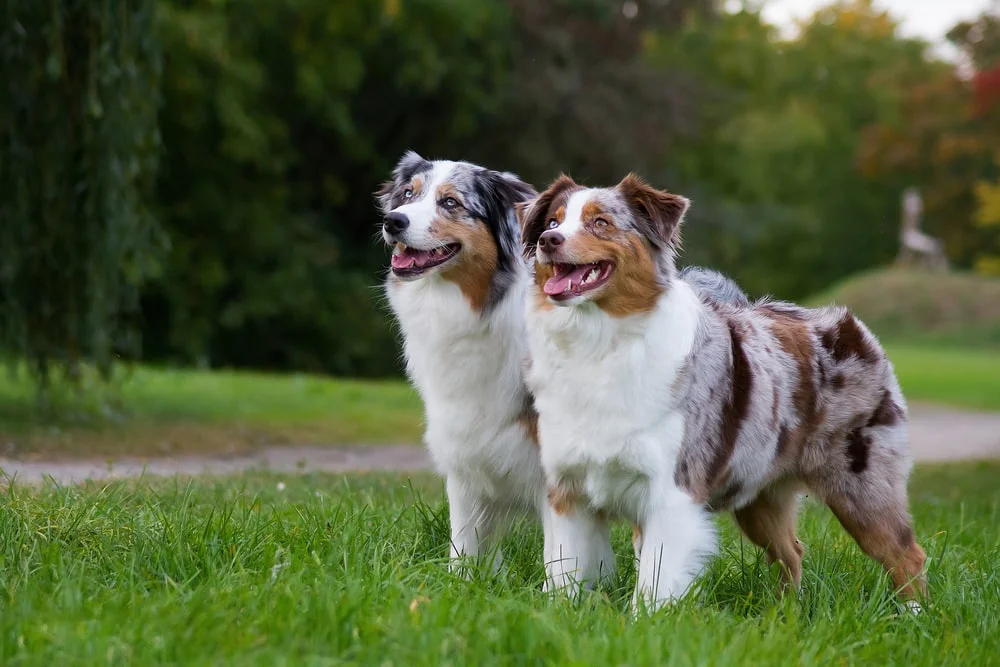BREED SPOTLIGHT
Australian Shepherd: Quick Stats
LIFESPAN:
12 – 15 years
WEIGHT:
40 – 65 lbs
HEIGHT:
18 – 23 inches
DO I SHED?
Yes
Personality:
Intelligent, athletic, good with kids
Common Health Problems:
Hip dysplasia, eye conditions, drug sensitivity
Australian Shepherd: How Do I Look?
Australian shepherds, also known as Australian sheepdogs, are medium sized dogs known for their striking eye color combinations and speckled — known as merle — coats. There is also a miniature Australian shepherd with similar characteristics to its full-sized counterpart.
Coat type and colors
Aussies have a waterproof, double coat. Their coats are medium length but can be straight or wavy with some feathering. The American Kennel Club accepts the following colors and markings as part of the official Australian shepherd breed standard:3
- Black
- Blue merle
- Red
- Red merle
- White markings
- Tan points
- White markings with tan points
Shedding and grooming
Australian shepherds are moderate shedders that are easy to groom. They require weekly brushing but rarely need full baths. Because they have a double coat, using an undercoat rake every few days is usually recommended.
Their coats are fairly weatherproof, but Aussies may need a bath after harder working days or muddy play sessions. If you notice your Aussie’s coat becoming tangled or matted, you might decide to maintain a shorter coat.
Ears and Tails
Aussies’ ears are triangular, upright, leather-like, and uncropped. Their tails are straight and traditionally docked if not naturally bobbed.
Although docking is considered part of the breed standard for Australian shepherds, the American Veterinary Medical Association considers docking unnecessary, even for working breeds.3,4
Drooling level
Drooling should generally not be an issue for Australian shepherds.
Aussie: Personality Traits
What My Adoption Bio Would Say:
If you’re someone who’s just as smart and energetic as me, I’m the pup for you! Adventure is out there, and I’m ready to go, go, go anywhere. But let your guard down, and I’ll run circles around you like the playful trickster I am.
Behavior
Australian shepherds are herding dogs through and through. They are extremely hard-working and intelligent, and they thrive when given tasks to stay busy. Aussies also form strong bonds with their owners.
This super smart working breed requires plenty of physical and mental stimulation. They’re the happiest when there’s a problem to solve or a job to do. If left unstimulated, Aussies can get into mischief. Give your Australian sheepdog new puzzles and tasks to keep them from misbehaving.
Keep in mind that this breed needs an owner who can meet all of their needs. If Aussies lack frequent activity, mental stimulation, or companionship, they can become destructive and territorial among other behavioral problems.
Trainability
Early socialization and obedience training is a must for Aussies. Luckily, they are extremely intelligent and eager to please their pet parents. This results in successful and relatively easy training.
Exercise Needs
Australian shepherds need an owner that can meet their very high exercise needs. A short walk a day will not be enough to keep them happy and healthy.
They need at least 1 – 2 hours of daily exercise to satisfy their high energy levels and athletic ability. Luckily, Aussies make the perfect adventure buddy. With an Australian shepherd, you’ll have an excellent companion for long walks, hikes, and runs.
Good With Kids?
The Australian shepherd is very good with children and quickly becomes part of the family. Don’t be surprised if your Aussie herds the children in your household.
If you’re concerned about meeting the Aussie’s activity needs, there are plenty of other amazing dog breeds for families you can consider.
Good With Other Pets?
In general, Australian shepherds should be fine with other pets in the household.
Keep in mind that this breed is a sheepdog. They can be territorial and fiercely protective of their families, so early socialization is key to making them comfortable around pets outside of their flock.
Barking Level
Aussies can be barkers, but it won’t usually be an issue when they’re well-trained and properly stimulated.
Australian Sheepdog: A History
According to the AKC, the Australian sheepdog has a rich history.5 Here are a few interesting facts from their research:
- Despite its name, the Australian shepherd is a fully American breed that came out of the American West by ranchers in California.
- Adding to their rich history in cowboy culture, many Australian shepherds today are still herders and rodeo performers, but also popular therapy dogs.
- They’re believed to be descendants of the Pyrenean shepherd and British collie breeds.
- Aussies were officially recognized by the AKC in 1993.
Common Aussie Mixes
Australian sheepdogs are a very common breed to mix. Some of the popular Aussie mixes include:
- Texas heeler: Australian shepherd and blue heeler mix
- Border Aussie: Australian shepherd and border collie mix
- Aussiedoodle: Australian shepherd and poodle mix
- Aussie husky: Australian shepherd and husky mix
- Aussiedors: Australian shepherd and lab mix
- Auggie: Australian shepherd and corgi mix
- Australian retriever: Australian shepherd and golden retriever mix
9 Australian Shepherd Health Problems
According to the Australian Shepherd Club of America, Aussies may experience a number of health issues, including:6
- Hip dysplasia: This is an abnormal formation of the hip socket.
- Elbow dysplasia: These are multiple abnormalities in the elbow joint.
- Epilepsy: This can cause occasional seizures.
- Cataracts
- Cancer
- Deafness
- Osteochondrosis Dissecans (OCD): OCD is an orthopedic condition caused by improper cartilage growth.
- Hypothyroidism: This is caused by an overactive thyroid and metabolism.
- Drug sensitivity: Some drugs may become toxic in smaller doses.
The Orthopedic Foundation for Animals recommends that Aussies receive early health screenings and eye exams.7
Protect your Pets
Even the healthiest of pups can come with unexpected vet costs. Pet insurance can help keep your dog and your bank account happy.
How Pet Insurance Can Help Australian Shepherds
Australian shepherd health issues can be very costly. Pet insurance helps millions of pet parents afford the care they need.
Hip dysplasia
Hip dysplasia in dogs is a very painful disease involving a dog’s hip joint. The ball and socket joint does not work properly causing friction. It is most commonly caused by a genetic abnormality and can be passed through a dog’s hereditary line. Treatment may include surgery depending on the severity of the case.
Cancer
Australian shepherds can develop different forms of cancer. However, they are most likely to experience lymphoma and hemangiosarcoma. Lymphoma may be successfully treatable depending on your dog’s specific case, but unfortunately, hemangiosarcoma is very aggressive with a low survival rate.
Cataracts
Cataracts are an eye condition in dogs that leads to opaque lenses and vision problems. As cataracts develop, your dog may become fully blind in one or both eyes. Treatment for cataracts is surgery performed by a veterinary ophthalmologist.
A policy from MetLife Pet Insurance1 may be able to cover hip dysplasia, eye conditions, and cancers your Aussie could experience within their lifetime.2 But these aren’t the only conditions a pet insurance policy could help with. Learn more about how pet insurance covers your pet’s health and consider covering your Australian shepherd puppy early. That way your coverage isn’t limited by preexisting conditions.






